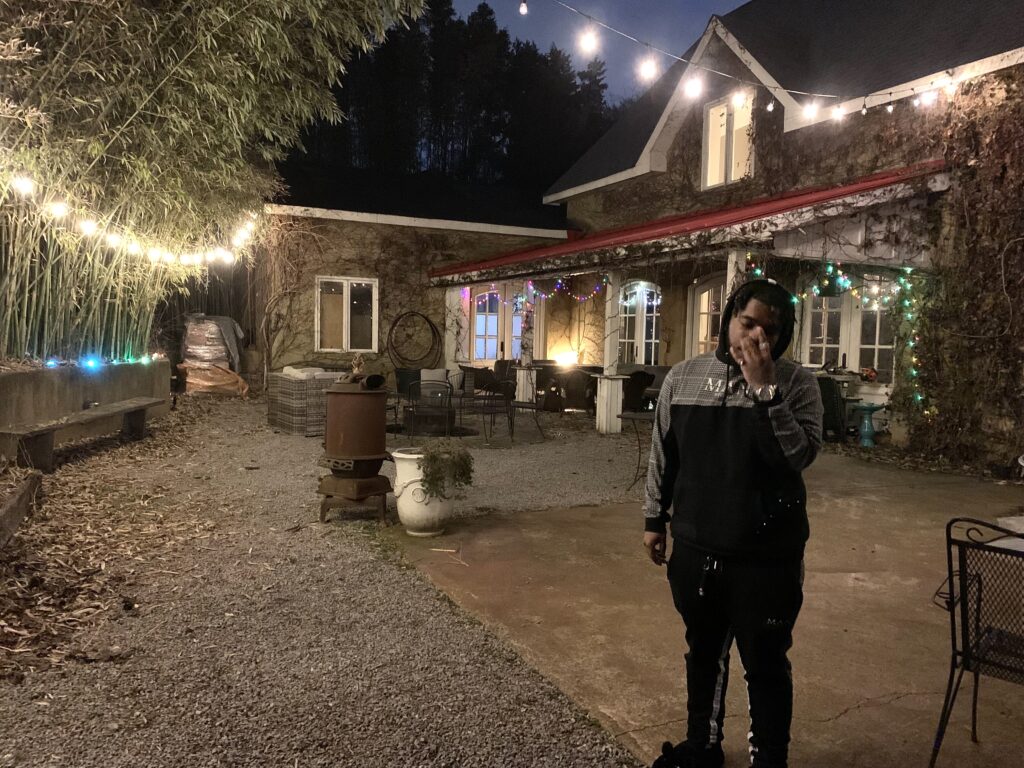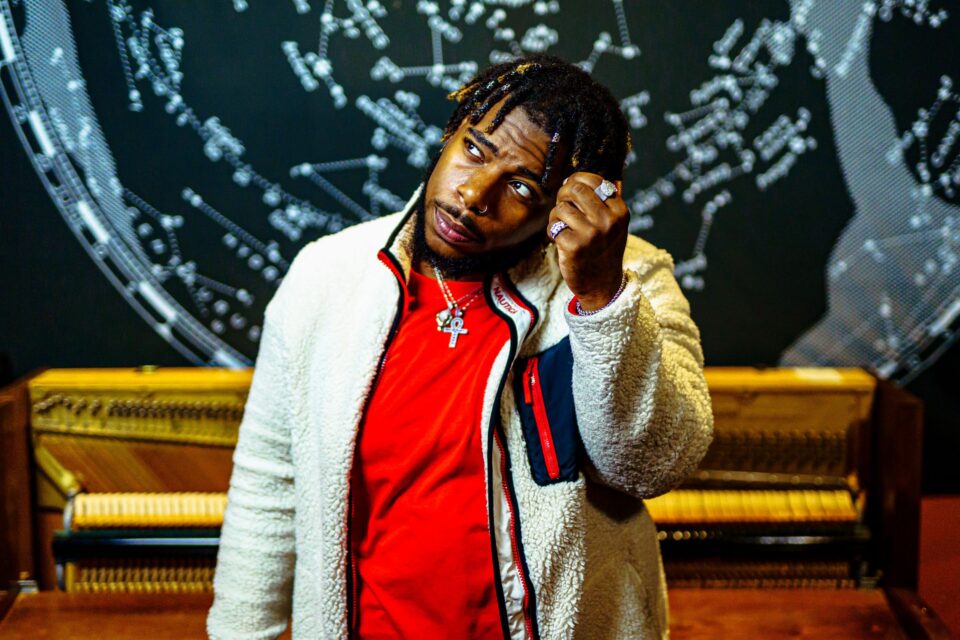In the process of introducing himself as an artist, AndréWolfe has already shown that he knows how to harness the power of mythology. From the title of his new album, Wolves Don’t Howl They Sing, to its tone of bruising disclosure and its cover image of a single wild canine turning from the pack to bellow at the sky, he plays out the radical reorientation that he’s undergone with his own musical expression.
Wolfe is one of 16 members of Six One Trïbe, one of Nashville’s largest and most active hip-hop collectives, and his full-length is part of their strategy to try to drop more new music this year, week by week, than any other outfit in the city. Trïbe styles itself as a crew carrying on the Wu-Tang template, making room for idiosyncratic individuals — “professional degenerates” in Trïbe parlance — to collaborate and do their own things without diluting their personalities. Wolfe had been operating as a lone wolf, rejected by the gospel community that utilized his youthful talents on drums, bass and keyboards, but didn’t want to hear him venture into dark truth-telling as a melodic rapper, until he connected with the collective that welcomed his keenest emoting.
“I’m not an antisocial person,” Wolfe explained during an interview at Eastside Manor, the vine-covered estate a few blocks in from a busy Inglewood thoroughfare where Trïbe rendezvous, records and rehearses, “but I was put in a lot of positions where I was traumatized to where I’d rather just isolate myself. But with all the aspects of being an artist, no man is by himself in a business like this. And I found the people that wanted to help. It’s good to be needed, and at the same time, I needed [them] as well.”
At their raucous, communal sessions, he refined songs like “Emo,” a track that nearly reaches operatic heights. When the beat and rumbling 808 pattern fall away, he laments over a chopped and looped string quartet: “Why is it so hard for me to love myself? Usually alone, because there’s no one left.” A couple of lines later, his delivery curdles into a sob as he voices his most fundamental need: “I just wanna be heard.”
“I have this thing where I go visit the mirror,” Wolfe said of those moments when his bleary, bluesy sing-rapping of pained lyrics land with potent clarity, “and it’s when I go literally deal with myself.”

On the Record: A Q&A with AndréWolfe:
Jewly Hight: You started in the gospel world. What was that like for you?
AndréWolfe: My mother is actually a gospel artist, Angela Williams. She is a God-fearing woman, and it was just me and my mom for a while. So anything my mom did, that’s what I’m doing. So I remember being [so young] I probably couldn’t even talk, but I’m in rehearsal with my mom. It’s loud, but, you know, I’m asleep. I’ve always been embedded in music and church.
JH: What kind of work did you do as a musician on the gospel circuit yourself?
AW: My first paying gig, I was eight-years-old. Like, that was my job. I was kind of like a [player] for hire. It went from drums to bass to a little piano here and there. But I was definitely gigging three times, four times a week, dissecting 30 songs a week. I was in a lot of churches.
I had a music mentor for a while, who was very inclined with the Nashville gospel music circuit. Me coming of age, this is early on. So I’m like 15, 16, 17. I took my path, and he took his, and once that relationship broke, the connection broke in the circuit. So that’s when it was like, “Okay, well, what does Andre want to do? If I’m not connected to the church circuit anymore, what would I do as an individual?”
I’ve always made beats, by the way. I started making beats when I was eight. That was a thing that my father did that rubbed off on me, which, really, my father showed me hip-hop. I didn’t know what would trap music was or anything until my father came into the picture.
JH: At first, you made beats for others. What motivated you to see what you could do vocally over your own instrumentals?
AW: At one point I was giving them away for free. Everything I do is with passion, so if I give you this piece of my passion and you treat it as, you know, a grain of salt, then that’s when I will turn. So I just was like, “I need to start rapping over my own stuff. I need to start taking control of how my music sounds in entirety.” And I did. That’s what started me rapping period.
JH: How did you become a part of Trïbe?
AW: [Co-founder and in-house producer] Aaron Dethrage was in the middle of making the record Trïbe Over Everything. And they had a song called “Live in the Trenches,” and they needed a piano player and he couldn’t find one. I walked in, and they greeted me with open arms. They handed me a blunt. They gave me something to drink, some water. They took care of me. I sat down, I look around and I’m like, “Yo, I play everything in here.” So I started playing everything, on top of recording the piano part.
And they were like, “What else do you do?” And I was like, “Oh, I’m an artist.” I showed them my music and they were like, “Yo, we got a session coming up in three days. Can you come?” And I was like, “Hell yeah. I want to be here again.” A relationship grew from then. I just kept coming to sessions, and and it felt like home. I was in the process of coming up with an idea for my next album. And I knew I needed help, but I made sure I would give as much as I could before I asked.
JH: When you when you started doing work as an artist, you were looking far away for inspiration, taking cues from the first waves of popular SoundCloud rap. What did it take to to find your own voice, to access the stuff that was that was in you?
AW: I’m real big on one phrase, and it’s a phrase that developed of seeing people who were good and then seeing people who were just amazing: Like, there’s a difference between potential and purpose. This journey, for me, is built on purpose. Even those tough cadences or crazy melodies, it’s not a matter of me flexing a muscle. It’s who I am. I also I work hard, like I’m always in it, from the car to the shower to my room. I have honed in so much on my craft.
JH: When you started working on your own music here at Eastside Manor, how was the creative process different from what you’d known?
AW: I had recorded [versions of] “Emo” and a few other things before I got here, and I just had those songs on me. They weren’t bad, but they just weren’t solid, you know? They weren’t done in my eyes. So when I came here, I seen how things were executed. There was just a level of quality that I felt like was the glue to what I needed. I brought the shells that I had previously recorded to Aaron. Aaron loved them and he was like, “I would love to evolve them.” And we evolved them.
It was also how much input was put into it. Because I would pull up and by 6:00 [pm] it’s 11 people here from Trïbe. And now I have [their] ears. I have 11 pathways that people are taking individually to wear their ears different. [They might hear] something that I might not catch.
JH: How did your songs “Emo” and “Pipebomb” together tell the story of how you went from feeling like an outsider to finding a home for your emotionally authentic new direction?
AW: So when I wrote them, I was in two different places in life. When I wrote “Emo,” I was actually on the plane to go bury my uncle who died from cancer. Before that, actually I had lost two very close friends to pills. So I was just in a dark place. I’m a very self-aware person and I will dig into myself and sit with the problem within myself. Me expressing that through music, it gave me a running-to-the-end-of-the-tunnel type feeling.
But “Pipebomb” was kind of like, “Okay, even though the predicament hasn’t changed, my mind frame has.” It has more faith and more confidence. It was a warrior story of being outcasted. I went from that to being able to stand and talk in front of anybody and everybody.

